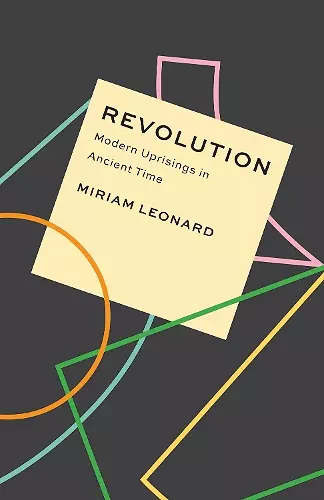Revolution
Modern Uprisings in Ancient Time
Format:Paperback
Publisher:The University of Chicago Press
Published:24th Nov '25
Should be back in stock very soon

A consideration of how modern revolutions have employed tropes of classical antiquity.
Despite its Latin etymology, “revolution” in its modern understanding arguably did not exist in antiquity, and revolution as we know it today is considered by many theorists to be a term born in modernity. While they certainly had times of momentous political upheaval, the Greeks and Romans tended to understand such events as part of a narrative of political continuity rather than novelty or rupture. Nevertheless, modern revolutions have repeatedly appropriated tropes of classical discourse, such as freedom, tyranny, tragedy, and fraternity.
With this book, Miriam Leonard offers a conceptual history of revolution, unraveling modernity’s yearning for the new and questioning why ancient concepts continue to play such an important role in political uprisings. Leonard looks at examples of appeals to antiquity during the French and Haitian Revolutions, in anticolonial struggles, and feminist and queer movements and considers works of theorists such as Karl Marx, Hannah Arendt, and Sigmund Freud that foreground an engagement with antiquity.
“Leonard is a wonderful guide to the thinking that grounds the violent and transformative politics of revolution, and, above all, its obsession with antiquity. Her incisive, revelatory and engaging account brilliantly analyses how an image of the past feeds the heady thrill and self-deceptive failures at the heart of modern desires to change the world.” -- Simon Goldhill, University of Cambridge
“What is the role of the past in the narration of modern revolt? If moderns yearn for the new, why do we turn to the ancients for inspiration? With characteristic flair, Miriam Leonard traces the twinned development since the eighteenth century of the idea of revolution and the discipline of classics. Leonard maps revolution’s literary history via the tropes of time, genre, and fraternity, and she thinks deeply about how theory is shaped by the images, arguments, and metaphors of revolution that also drive popular ideas about change. Brilliant, lucid, and witty, this book is a must-read.” -- Bonnie Honig, Brown University
“A revolutionary intervention in both critical theory and intellectual history, this book powerfully argues that revolution, the marker of modernity, cannot be thought of without antiquity. Offering surprising readings of Arendt, Derrida, Freud, Hegel, and Marx, among others, as well as Greek tragedy and Jacques-Louis David’s art, Leonard demonstrates that revolution is the site of temporal, discursive, and symbolic fissures opened up by modernity’s continuing return to the ancient and movement away from it. Just when socio-political counterimaginaries are needed more than ever, Leonard’s genealogy helps us understand the complexities of a concept that we should never take for granted.” -- Mario Telò, University of California, Berkeley
ISBN: 9780226843056
Dimensions: 216mm x 140mm x 13mm
Weight: 141g
112 pages